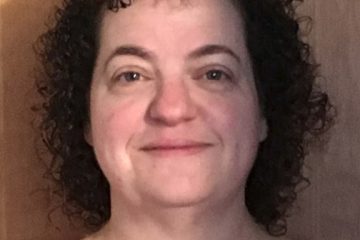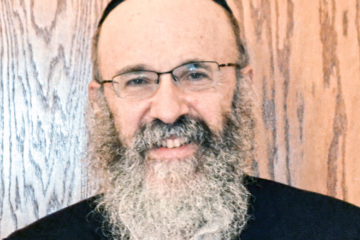Crisis center for pregnant Jewish women hopes to discourage abortions
Opponents say In Shifra’s Arms misleads clients, doesn’t provide enough information on choices
By Debra Rubin, Special To The Dayton Jewish Observer
SILVER SPRING, Md. — Erica Pelman believes there is plenty of support for Jewish women who find themselves unexpectedly pregnant and choose to abort. It’s typically the young and unmarried woman — uncertain about whether to end or continue her pregnancy — who doesn’t know where to turn.
To change that paradigm, Pelman created a nonprofit to help women in “crisis pregnancies.”

Her detractors, however, say that nonprofit is misleading and doesn’t give women enough information about their reproductive choices — or about Jewish perspectives on abortion.
The organization in question is In Shifra’s Arms, which provides assistance to pregnant Jewish women in crisis.
Inspired by a friend’s unplanned pregnancy, Pelman, a self-described modern Orthodox woman living in Silver Spring, Md., founded ISA — named for Shifra, one of the midwives who saved Hebrew babies from Pharaoh in the Exodus narrative. The friend had called her, saying she had chosen to abort.
“She was sobbing. I started crying,” Pelman remembers. “I felt so hopeless to offer her some other alternative. It was just heartbreaking.”
That 2005 call haunted Pelman. “It didn’t even occur to me at the time how many Jewish families would have wanted that baby,” she says.
In 2009, she organized a board to create a nonprofit to provide a Jewish alternative to Christian pregnancy crisis centers, with the aim of providing counseling, financial planning, employment and educational assistance, Jewish adoption information, rabbinic counseling and even maternity and baby clothing. ISA became a 501(c)(3) last year.
She and another volunteer took part in training offered by the Rockville Pregnancy Clinic in Maryland. ISA, whose volunteers include a social worker and physicians, has since designed its own training program. Pelman also wrote a manual to connect women with birthing centers, health care, housing lists, adoption information, couples mediation and the like. ISA care packages include Jewish books on pregnancy and childbirth, along with practical items like Preggie Pops, designed to help ease nausea.
“We will be here to offer support every step of the way, through the birth and for a year afterward,” says Pelman, who believes ISA is the only Jewish group of its kind in the United States.
She emphasizes that she doesn’t want women to feel pressured into a quick decision. Some of that time pressure arises because many women opt for the abortion pill, RU 486, which must be taken by the seventh week of pregnancy.
“Some people feel pressured in the sense that because they don’t have the answers now, they should abort,” she explains in an e-mail. “It feels like them vs. baby, but it’s possible frequently to make positive choices for themselves and the baby.”
The all-volunteer ISA remains an online center — a limited hours telephone help line was established earlier this year — and has so far assisted fewer than a dozen women.
Pelman, who laments the difficulty she has had finding information and services for women from outside her local area, hopes that Jewish communities nationwide will use ISA’s resource guide as a model to create their own local material.
“We target unplanned pregnancies and not people struggling with prenatal diagnosis,” Pelman adds. “In the future, I do want to create a separate organization offering hope to couples struggling with this issue.”
What ISA doesn’t do is provide abortion information or referrals. Jewish law itself, however, leaves the door open to abortion, allowing for a woman’s physical health, and sometimes her emotional wellbeing, to take precedence over the fetus’ life.
Most of the non-Orthodox organized Jewish community supports abortion rights for women — in line with the majority of Jews themselves. A 2009 Pew report found that 84 percent of Jews support abortion in most or all cases.
Rabbi Bonnie Margulis, who is active with the Religious Coalition for Reproductive Choice, complains that ISA doesn’t leave room for abortion.
“I think it’s fabulous” that the organization will help a woman during her pregnancy and for the following year, she says, but she also criticizes the group’s website for “steering women away from abortion and making women feel guilty about” choosing to end a pregnancy.
The site does that, she says, by including on its blog, for example, “heart-wrenching” stories of women who risked their lives to give birth. The message such stories send, Margulis says, is, “If a woman in a concentration camp can give birth to a baby, oh, my God, how could you abort. You’re not in a camp.”
ISA does not provide information on contraception either. That’s “beyond our scope,” Pelman says.
The nonprofit came under fire in the blogosphere last year for linking to what its critics charged was inaccurate information about abortion. ISA has since removed that link. “It was distracting,” Pelman says.
Pelman is sensitive to the criticism and has made other changes, as well — eliminating, for example, a link to an abortion information page provided by Aish HaTorah, an Orthodox Jewish group.
If a woman chooses to abort, ISA tells her, “If there is trauma afterward, we will refer her to post-abortion help.”
Pelman recognizes that is in itself controversial, implying that abortion is traumatic. “No matter what we do, somebody is going to say we’re doing it wrong.”
Rabbi Peter Stein of Temple Sinai of Rhode Island is among ISA’s detractors. Active in the Religious Coalition for Reproductive Choice, Stein says ISA “doesn’t seem to recognize the challenges and reasons why some women would choose to end an unwanted pregnancy,” he writes in an e-mail.
Pelman, believes the non-Orthodox Jewish community has made abortion too acceptable. Using Planned Parenthood statistics on abortion, along with the 2000 National Jewish Population Survey, she estimates 10,000 abortions are performed on Jewish women in the United States annually.
“Before Roe vs. Wade, there were actually Jewish maternity homes,” she laments.
“They all closed in the ’70s. There is no Jewish community support for giving birth (if you’re in crisis). There’s no way to know how that’s impacted our Jewish community.”
Though she emphasizes that ISA exists as a resource to assist women, she admits that by helping women, it can help bring more Jewish babies into the world — whether the birth mother keeps her baby or gives the child up for adoption. Jewish couples, both straight and gay, seeking to adopt may post their stories on the ISA website.
Indeed, says Pelman’s rabbi, Shmuel Herzfeld, one of ISA’s rabbinic advisers: “If we’re able to make a difference to people who might want to keep their baby, that is a great way to add to the strength of the Jewish people.”
Sarahleah R. is among those women for whom ISA made a difference. At 19, she was single, a part-time student and shocked to learn she was pregnant. She didn’t know how she could have conceived — until she flashed back to a party nine weeks earlier.
She recalled being given a drink, realizing it was vodka and then passing out. Sarahleah had been raped.
“i (sic) was in shock and felt like my life was over,” she wrote in an e-mail, asking that her full name not be used. “I was very scared because i had nothing and was trying to figure out how i was going to support myself and the baby.”
She looked into the possibility of giving her baby up for adoption, but ultimately decided she wanted to prove herself as a mother. Her rabbi’s wife referred her to ISA.
Sarahleah gave birth in November. ISA’s counseling, she writes, made her see her child “as a gift from above.”





